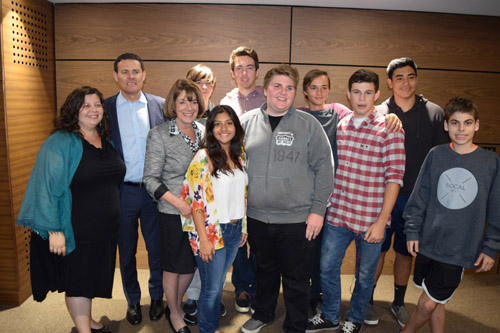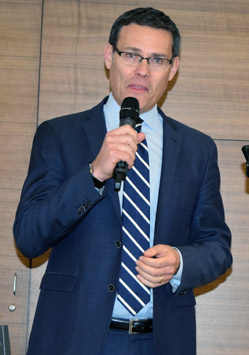
By Donald H. Harrison


SAN DIEGO — There was a modicum of tension before Israel’s Consul -General based in Los Angeles, David Siegel, spoke in the upstairs auditorium of the new Melvin Garb Hillel Center alongside the San Diego State University campus. After all, there were security precautions taken and Resa Levitt Kohn, head of SDSU’s sponsoring Jewish Studies Program, had felt it necessary prior to Siegel’s speech to request that everyone in the audience be both respectful and polite.
As it turned out, everyone was respectful, and whatever tension there might have been before the speech evaporated as it progressed. The public forum became so relaxed that, at one point, Siegel even removed his tie and loosened his collar.
In a way, the atmosphere surrounding Siegel’s appearance mirrored the content of his speech, for which he was introduced by Sarah Katularu, representing Students Supporting Israel. Siegel told his audience about many matters causing Israel worry – among them Iran, ISIS, Hezbollah, and Hamas – but he also warmed pro-Israel listeners by offering an upbeat assessment about how, from a commercial standpoint, Israel is faring in the world.
One questioner expressed concern about anti-Semitism and the boycott, divestment and sanctions (BDS) campaigns that have become so prevalent on American college campuses. While this is of course a concern, Siegel responded, Israel is doing business with more and more partners throughout Africa, Asia, and Eastern and Central Europe.
He cited strong relations between Israel and Azerbaijan, a Shi’ite country on Iran’s northern border. India, which was once part of the non-aligned block that had spurned relations with Israel, now has robust trade agreements with Israel, including those for cybersecurity. China is doubling its bilateral trade with Israel, and exports and imports are increasing with Japan, South Korea and Vietnam. Furthermore, the consul-general said, Israel’s discovery of large natural gas deposits in the Mediterranean have spurred growth in business relationships between Israel and partners like Cyprus, Greece and various countries of Eastern and Central Europe.
That wasn’t to say that there isn’t cause for worry, especially in Western Europe. Although leaders of countries like France say such reassuring words as France would not be France without the Jews, there have been enough incidents like the recent Charlie Hebdo and HyperCacher murders to prompt many French Jews to decide to immigrate to Israel. One can hear more French than ever before in the streets of Israel’s cities, Siegel reported.
The consul-general acknowledged that the status of Israel’s relations with the United States in the aftermath of Prime Minister Benjamin Netanyahu’s March 3 speech to a joint session of Congress was probably on the minds of everyone in the room. Given that a Jewish Democratic member of Congress, U.S. Rep. Susan Davis of San Diego, attended Siegel’s speech along with her husband, Dr. Steve Davis, one can imagine that the seasoned diplomat may have felt the need to choose his words very carefully on that subject.
He said he was aware that there was controversy over the timing of the speech as Netanyahu had delivered it just two weeks before Israel’s March 17 election. However, he said Netanyahu believed there really was no alternative to giving it on that date. March 24 is the date by which the P5+1 countries and Iran are supposed to reach an agreement, and if Netanyahu gave his speech too long after the March 3rd date, an agreement might have already been finalized and the speech would have done little good.
Siegel reiterated what Netanyahu himself had told the Republican dominated Congress: that he respects and admires the Democratic President Barack Obama and is grateful for the many ways in which the Obama administration has come to Israel’s aid, some of those ways being public, and others intentionally kept private. Like Netanyahu, Siegel expressed the belief that the U.S.-Israel relationship must be kept strictly bipartisan.
On the issue of Israel’s relations with the Palestinians, Siegel said that Israel desires to return to the negotiating table, but at this point leaders of the Palestinian Authority prefer not to negotiate, but instead to go forward with a campaign to bring Israel’s leaders before the International Criminal Court. He said this was regretful, because although it may have simply been meant as a strategy to pressure Israel, once the court’s inquiries began, it set into motion processes that neither the Israeli’s nor the Palestinians can control. It is not be possible to put the genie back in the bottle, he commented.
When the question-and-answer session concluded, members of the audience—including Hillel students and their mentor Hillel director Jackie Tolley, and Community Jewish High School students and their teacher, Rabbi Devorah Marcus of Temple Emanu-El – took turns taking group photos with the diplomat.Other attendees formed a queue to ask him a question or two.
Future “Israel in the 21st Century” lecture series presentations of SDSU’s Jewish Studies Program include Dr. Mohammed Watttad, an assistant professor at Zefat College School of Law, discussing “Israeli Arabs in Israel’s Policy Making,” at 7 p.m., Wednesday, March 18, and Dr. Eugene Kontorovich, Northwestern University School of Law on “Israel’s International Legal Challenges: What Lies Ahead?” at 7 p.m., Thursday, April 16. Both free lectures will be held at the Hillel Center at 5717 Lindo Paseo, with parking available across the street in SDSU’s Parking Lot 2.
*
Articles on San Diego Jewish World concerning Jewish women in Congress are sponsored by Laura Galinson in memory of her father, Murray Galinson.
*
Harrison is editor of San Diego Jewish World. Your comment may be sent to donald.harrison@sdjewishworld.com, or posted, per below.
__________________________________________________________________
Care to comment? San Diego Jewish World is intended as a forum for the entire Jewish community, whatever your political leanings. Letters may be posted below provided they are civil, responsive to the article that prompted them, and signed with your first and last name, as well as with your city of residence. There is a limit of one letter per writer on any given day.
__________________________________________________________________